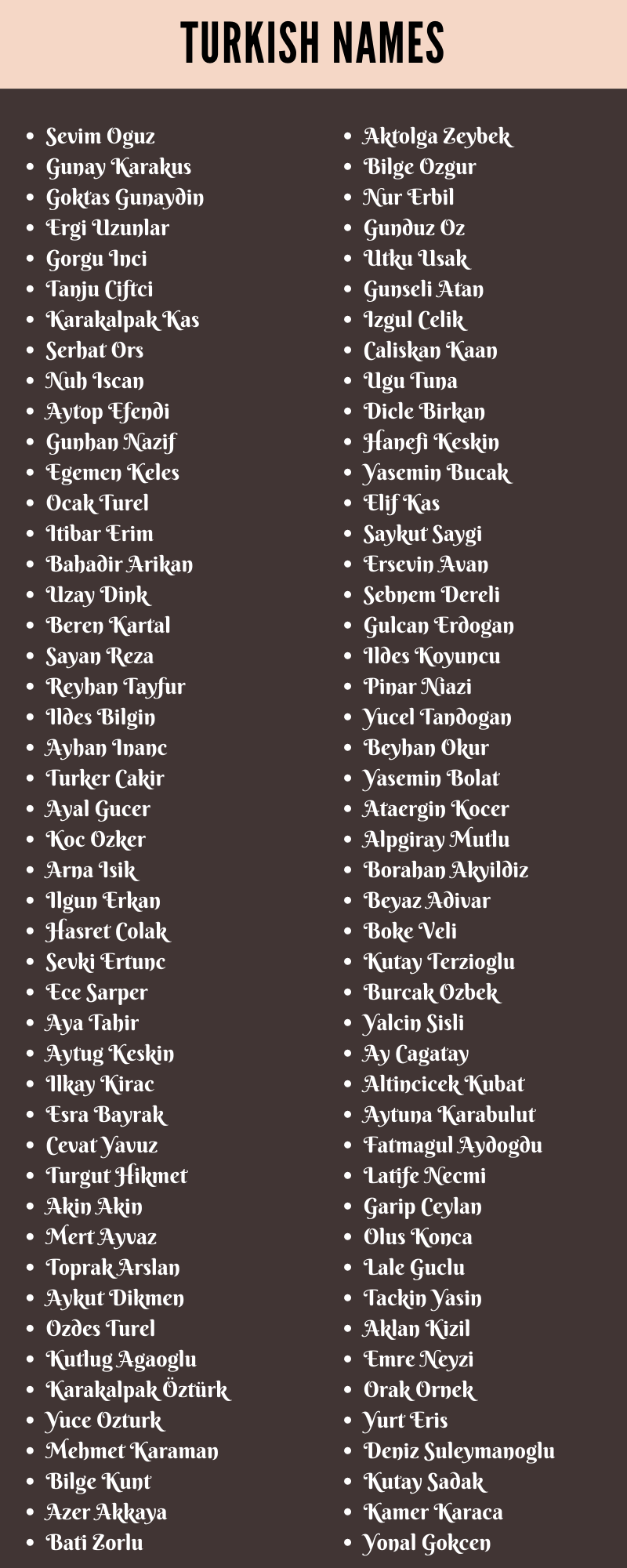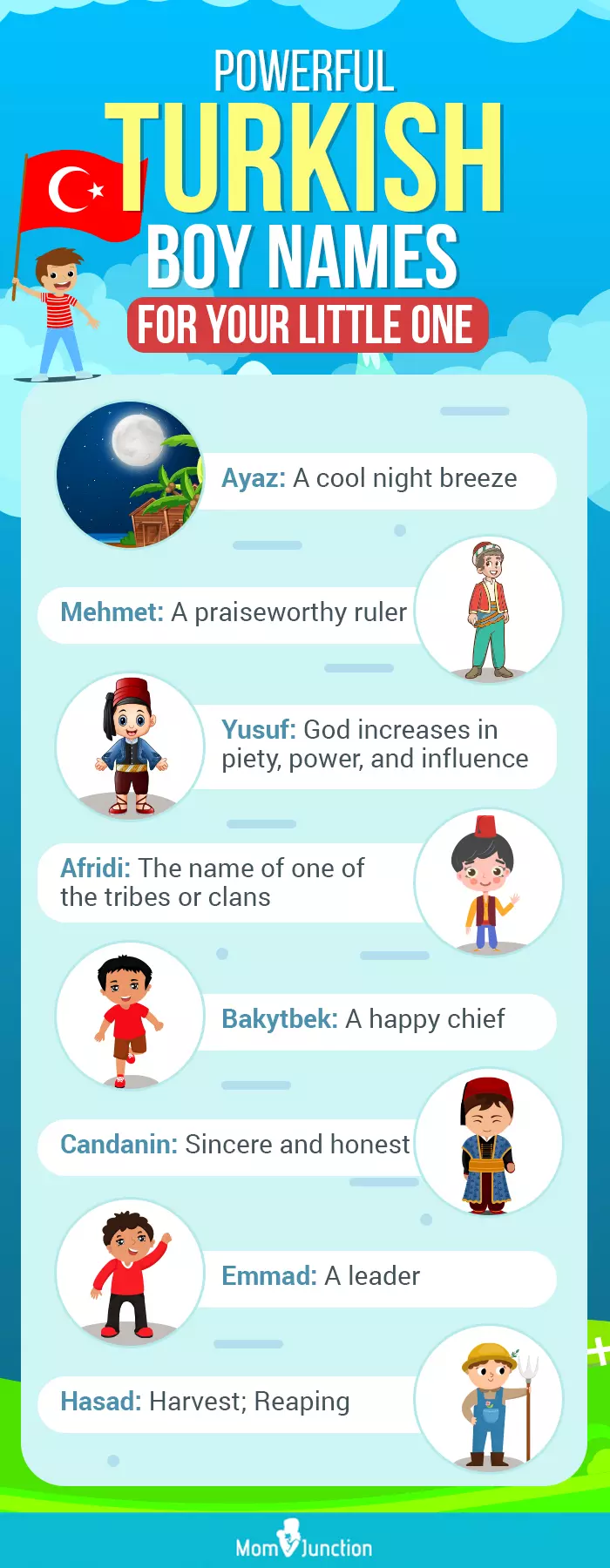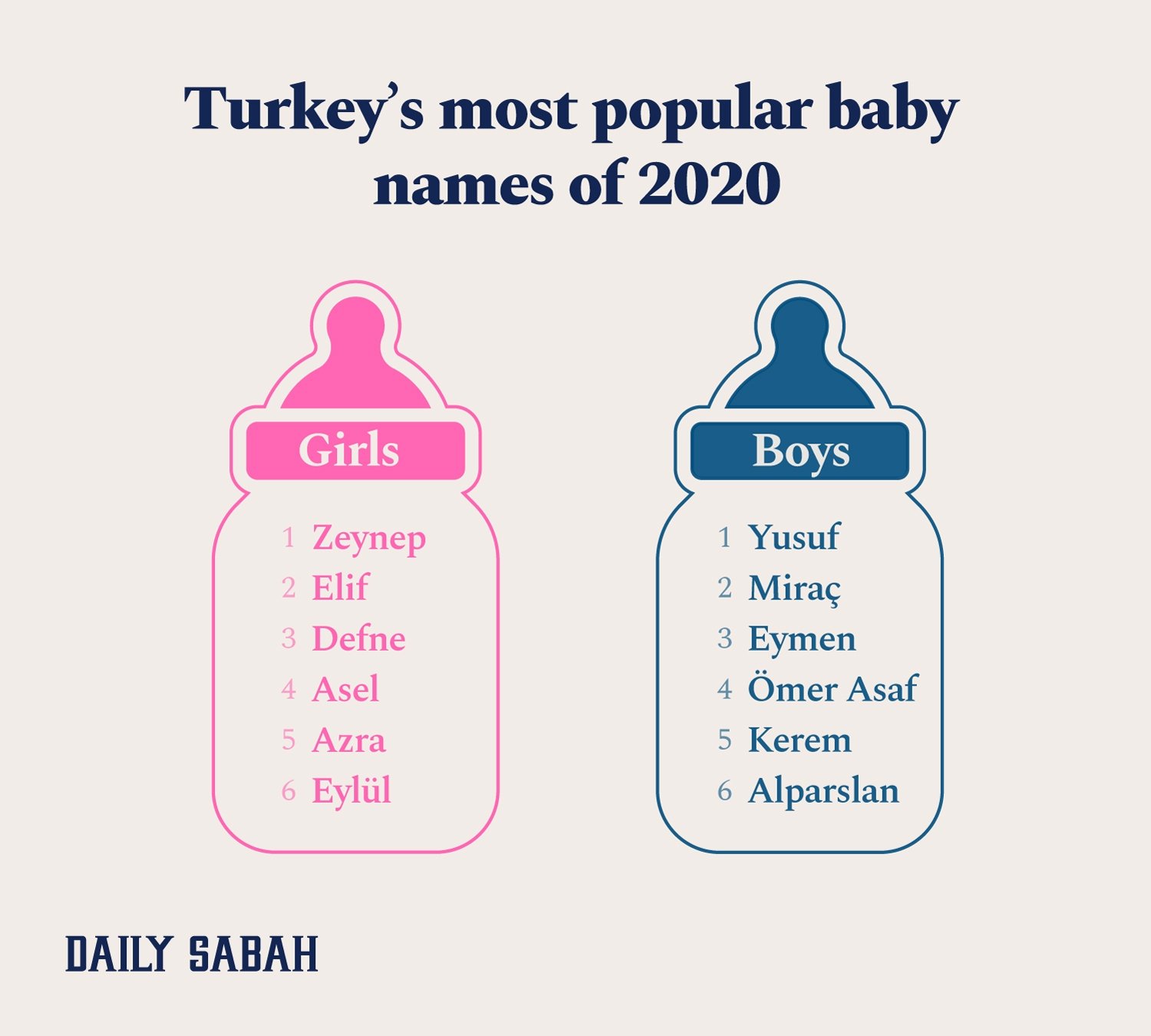Looking for a unique and meaningful name for your baby boy? Look no further than Turkey, a country with a rich history and culture reflected in its beautiful and evocative names.
Turkish male names are typically strong, masculine, and often have a special meaning or significance. They can be inspired by nature, history, or religion, and many have been passed down through generations. Whether you're looking for a traditional name or something more modern, you're sure to find the perfect name for your little boy among the many common Turkish male names.
Some of the most popular common Turkish male names include:
| Ahmet | Most praised |
| Mehmet | Praised |
| Hasan | Good |
| Hseyin | Little Hasan |
| Ali | High, exalted |
These are just a few of the many common Turkish male names. With so many beautiful and meaningful names to choose from, you're sure to find the perfect name for your baby boy.
Common Turkish Male Names
Name Variations and Meanings
Turkish male names can vary depending on the region of the country. For example, the name "Mehmet" is more common in the east, while the name "Ali" is more common in the west. Some names also have different meanings depending on the context in which they are used.
For example, the name "Hasan" can mean "good" or "handsome," while the name "Hseyin" can mean "little Hasan" or "good-looking."
Cultural Significance
Turkish male names often have a cultural or religious significance. For example, the name "Ali" is the name of the fourth caliph of Islam, while the name "Mehmet" is the Turkish form of the Arabic name "Muhammad," the prophet of Islam.
Many Turkish male names are also inspired by nature. For example, the name "Da" means "mountain," while the name "Deniz" means "sea."
Choosing a Name
When choosing a name for your baby boy, there are many factors to consider. You may want to choose a name that has a special meaning to you or your family, or you may want to choose a name that is popular or unique.
Whatever you choose, make sure it is a name that you love and that you think your son will be proud to wear.
Common Turkish Male Names
Turkish male names are rich in meaning and history, reflecting the country's diverse culture and traditions. Here are eight key aspects to consider when exploring common Turkish male names:
- Meaning: Turkish male names often carry special meanings, such as virtues, natural phenomena, or religious figures.
- Origin: Names can originate from various sources, including Arabic, Persian, and Turkic languages.
- Popularity: Certain names have been consistently popular throughout history, while others have gained popularity in recent times.
- Regional Variations: Names may vary depending on the region of Turkey, reflecting local customs and traditions.
- Cultural Significance: Names can hold cultural or religious significance, connecting individuals to their heritage.
- Modern Trends: Contemporary influences have led to the emergence of more unique and modern names.
- Famous Bearers: Notable figures in Turkish history, culture, and society have popularized certain names.
- Legal Considerations: Turkish law has specific regulations regarding the naming of children.
These aspects provide a comprehensive understanding of common Turkish male names, highlighting their cultural, historical, and linguistic significance. From traditional names rooted in Islamic heritage to modern names reflecting contemporary trends, Turkish male names offer a diverse and meaningful choice for parents.
Meaning: Turkish male names often carry special meanings, such as virtues, natural phenomena, or religious figures.
The meanings embedded within Turkish male names hold significant cultural and personal value. Many names are chosen to reflect virtues or desirable qualities, such as "Yiit" (brave) or "Doru" (honest). Others draw inspiration from nature, with names like "Deniz" (sea) or "Da" (mountain) capturing the beauty and grandeur of the natural world.
Religious beliefs also play a role in shaping the meanings of Turkish male names. "Abdullah" (servant of God) and "Muhammad" (the praised one) are examples of names that reflect the Islamic faith. These names serve as a reminder of the individual's connection to their spiritual beliefs and values.
Understanding the meanings behind common Turkish male names provides insights into the cultural, social, and religious influences that have shaped Turkish society. It also allows us to appreciate the depth and diversity of Turkish naming traditions.
Origin: Names can originate from various sources, including Arabic, Persian, and Turkic languages.
The origins of common Turkish male names are diverse, reflecting the rich cultural heritage and linguistic influences that have shaped Turkish society. Arabic, Persian, and Turkic languages have all contributed to the formation of Turkish male names, each leaving its unique mark on the linguistic landscape.
Arabic, the language of the Quran, has had a profound impact on Turkish male names, particularly those with religious connotations. Names such as "Abdullah" (servant of God), "Muhammad" (the praised one), and "Ibrahim" (friend of God) are examples of Arabic-origin names that have become widely used in Turkey. These names hold deep religious significance and serve as a testament to the influence of Islam on Turkish culture.
Persian, the language of ancient Persia, has also contributed a significant number of names to the Turkish lexicon. Names like "Ali" (exalted), "Mehmet" (praised), and "Mustafa" (chosen one) are all of Persian origin and have been popular in Turkey for centuries. These names often carry meanings related to strength, nobility, and virtue, reflecting the cultural values of the Persian people.
Turkic languages, spoken by various ethnic groups in Central Asia and Turkey, have also played a role in shaping the origins of common Turkish male names. Names like "Alp" (hero), "Er" (man), and "Deniz" (sea) are examples of Turkic-origin names that evoke a sense of strength, courage, and connection to the natural world. These names reflect the nomadic and warrior traditions of the Turkic peoples and their close relationship with the environment.
Understanding the origins of common Turkish male names provides insights into the historical and cultural influences that have shaped Turkish society. It also allows us to appreciate the diversity and richness of Turkish naming traditions, which have been influenced by a multitude of linguistic and cultural sources.
Popularity: Certain names have been consistently popular throughout history, while others have gained popularity in recent times.
The popularity of common Turkish male names has been influenced by a combination of historical, cultural, and social factors. Certain names have maintained their popularity over centuries, while others have gained popularity in more recent times.
- Historical Names
Names like "Mehmet" and "Ali" have been consistently popular throughout Turkish history. These names are often associated with important historical figures or religious leaders, and they carry a sense of tradition and heritage.
- Cultural Influences
Cultural factors have also played a role in the popularity of certain Turkish male names. For example, the name "Emir" (meaning "prince") has become increasingly popular in recent years due to its association with popular Turkish TV shows and movies.
- Modern Trends
Modern trends have also influenced the popularity of Turkish male names. Parents are increasingly choosing unique and modern names for their children, such as "Ege" (meaning "Aegean Sea") or "Atlas" (meaning "giant").
- Geographical Factors
Geographical factors can also influence the popularity of certain Turkish male names. For example, the name "Deniz" (meaning "sea") is more popular in coastal regions of Turkey, while the name "Da" (meaning "mountain") is more popular in mountainous regions.
The popularity of common Turkish male names is a reflection of the diverse cultural, historical, and social influences that have shaped Turkish society. By understanding the factors that contribute to the popularity of certain names, we can gain insights into the values and beliefs of the Turkish people.
Regional Variations: Names may vary depending on the region of Turkey, reflecting local customs and traditions.
The diversity of common Turkish male names is influenced by the rich regional variations within Turkey. Different regions have their own unique customs and traditions, which are reflected in the names that parents choose for their children.
- Geographical Influences
Geographical features can influence the popularity of certain names in different regions. For example, the name "Deniz" (meaning "sea") is more common in coastal regions, while the name "Da" (meaning "mountain") is more common in mountainous regions.
- Cultural Traditions
Cultural traditions also play a role in shaping regional variations in names. For example, in the eastern part of Turkey, names with Arabic origins are more common, while in the western part of Turkey, names with Turkish origins are more common.
- Historical Events
Historical events can also influence the popularity of certain names in different regions. For example, the name "Atatrk" (meaning "father of the Turks") became popular after the foundation of the Turkish Republic in 1923.
- Family Lineage
Family lineage can also influence the choice of name in certain regions. For example, in some regions, it is customary to name the firstborn son after the paternal grandfather.
These regional variations in common Turkish male names provide insights into the diverse cultural, geographical, and historical influences that have shaped Turkish society. By understanding these variations, we can gain a deeper appreciation for the richness and diversity of Turkish naming traditions.
Cultural Significance: Names can hold cultural or religious significance, connecting individuals to their heritage.
Turkish male names often carry cultural or religious significance, reflecting the deep-rooted traditions and beliefs of Turkish society. These names serve as a connection to the past and a way to honor family heritage and cultural values.
- Religious Significance
Many Turkish male names have religious connotations and are inspired by Islamic beliefs and figures. Names such as "Abdullah" (servant of God), "Muhammad" (the praised one), and "Ibrahim" (friend of God) are examples of names that hold religious significance and connect individuals to their Islamic faith.
- Historical Significance
Some Turkish male names are associated with important historical figures or events. For example, the name "Atatrk" (father of the Turks) was adopted by Mustafa Kemal Atatrk, the founder of the modern Turkish Republic, and has become a popular name among Turkish males.
- Cultural Heritage
Turkish male names can also reflect cultural heritage and traditions. Names such as "Alp" (hero), "Er" (man), and "Deniz" (sea) evoke images of strength, courage, and the natural beauty of Turkey.
- Family Lineage
In some Turkish families, it is customary to name the firstborn son after the paternal grandfather. This practice serves to honor family lineage and preserve the memory of ancestors.
The cultural significance of common Turkish male names highlights the importance of tradition, heritage, and religious beliefs in Turkish society. These names serve as a reminder of the rich history and cultural tapestry that has shaped Turkey and its people.
Modern Trends: Contemporary influences have led to the emergence of more unique and modern names.
In contemporary Turkish society, the influence of globalization, social media, and popular culture has led to the emergence of more unique and modern names for boys. Parents are increasingly seeking names that stand out from traditional choices, reflecting their individuality and aspirations for their children.
- International Influences
The exposure to foreign cultures through media and travel has influenced the choice of names. Turkish parents are now more open to choosing names from different languages and cultures, such as "Alexander" or "Ethan".
- Pop Culture References
Popular TV shows, movies, and music have also played a role in shaping naming trends. Names like "Emir" and "Kerem", popularized by Turkish soap operas, have gained widespread popularity.
- Unique and Creative Names
Parents are also opting for more unique and creative names, often inspired by nature, mythology, or personal preferences. Names like "Doa" (meaning "nature") and "Atlas" (meaning "giant") reflect this trend.
- Personalization
The desire for personalization has led to the creation of new names or variations of existing names. Parents are combining traditional names with modern elements or adding unique spellings to make their child's name stand out.
These modern trends in Turkish male names reflect the changing values and aspirations of Turkish society, where individuality, creativity, and global influences are increasingly shaping personal choices.
Famous Bearers: Notable figures in Turkish history, culture, and society have popularized certain names.
The connection between famous bearers and common Turkish male names is significant. Notable figures throughout history, culture, and society have played a crucial role in popularizing certain names, influencing parents' choices and shaping naming trends.
For instance, the name "Mustafa" gained immense popularity after Mustafa Kemal Atatrk, the founder of the Turkish Republic, adopted it as his surname. Similarly, the name "Recep" became more common after Recep Tayyip Erdoan, the current President of Turkey, rose to prominence.
In the realm of arts and culture, famous actors, singers, and writers have also influenced naming patterns. For example, the name "Kenan" became popular after the renowned actor Kenan mirzalolu, while the name "Tarkan" gained popularity due to the international fame of the singer Tarkan Tevetolu.
The influence of famous bearers extends beyond political and cultural figures. Sports stars, such as the soccer player Arda Turan, have also popularized certain names among Turkish parents. By showcasing success, talent, and admirable qualities, these individuals make their names more desirable and associated with positive attributes.
Understanding the connection between famous bearers and common Turkish male names provides insights into the social and cultural factors that shape naming practices. It highlights the power of role models and the impact of public figures on society's choices.
Legal Considerations: Turkish law has specific regulations regarding the naming of children.
In Turkey, the naming of children is subject to certain legal considerations that aim to protect the rights and well-being of children and uphold cultural and social norms.
- Name Length and Content
Turkish laws that a child's name must consist of at least two syllables and cannot exceed 20 characters. Additionally, the name cannot include any characters that are not part of the Turkish alphabet, special characters, or numbers.
- Prohibited Names
Certain names are prohibited by law, including names that are offensive, vulgar, or contrary to public morality. Names that promote discrimination or hatred are also not permitted.
- Cultural and Religious Considerations
Turkish law recognizes the importance of cultural and religious traditions in naming practices. Parents are generally free to choose names that reflect their cultural or religious beliefs, as long as they comply with the other legal requirements.
- Name Changes
In some cases, individuals may wish to change their name later in life. Turkish law allows for name changes under specific circumstances, such as marriage, adoption, or if the individual can demonstrate a compelling reason for the change.
These legal considerations play a role in shaping the landscape of common Turkish male names. They ensure that children are given names that are appropriate, respectful, and in line with societal norms. Understanding these legal considerations provides a deeper appreciation for the complexities and nuances of Turkish naming practices.
Frequently Asked Questions about Common Turkish Male Names
This section addresses commonly asked questions and misconceptions surrounding common Turkish male names, providing informative and comprehensive answers.
Question 1: What are the most popular common Turkish male names?Among the most popular common Turkish male names are: Mehmet, Ali, Ahmet, Hasan, and Hseyin. These names have been consistently popular throughout history and hold significant cultural and religious meanings.
Question 2: Are there any legal restrictions on naming children in Turkey?Yes, Turkish law has specific regulations regarding the naming of children. Names must consist of at least two syllables, cannot exceed 20 characters, and cannot include offensive or vulgar language. Additionally, certain names are prohibited by law, such as those that promote discrimination or hatred.
Understanding these common questions and their answers provides a deeper insight into the cultural, legal, and historical factors that shape the landscape of common Turkish male names.
Conclusion
Common Turkish male names are steeped in history, culture, and tradition. They reflect the rich heritage of Turkey and the diverse influences that have shaped its society. From names with religious significance to those inspired by nature and cultural heroes, Turkish male names offer a glimpse into the values and beliefs of the Turkish people.
Understanding the meanings, origins, and cultural significance of these names provides a deeper appreciation for the beauty and diversity of Turkish culture. It also highlights the importance of names in shaping our identities and connecting us to our heritage.



Detail Author:
- Name : Simeon Gaylord
- Username : fatima.kohler
- Email : freddie.lowe@kertzmann.com
- Birthdate : 1994-04-15
- Address : 907 Karlie Squares Lake Rosemarymouth, KS 61701
- Phone : 283-883-0602
- Company : Kris-Weimann
- Job : Supervisor Correctional Officer
- Bio : Quia est assumenda qui. Animi enim assumenda vel et occaecati enim at. Est praesentium molestias nulla exercitationem maxime doloribus qui.
Socials
tiktok:
- url : https://tiktok.com/@neal5857
- username : neal5857
- bio : Praesentium excepturi quidem autem occaecati et dolorem autem quia.
- followers : 4985
- following : 2820
instagram:
- url : https://instagram.com/neal_xx
- username : neal_xx
- bio : Autem quia assumenda molestiae asperiores occaecati repellendus. Totam magnam ut sint.
- followers : 4211
- following : 2848
twitter:
- url : https://twitter.com/nealbreitenberg
- username : nealbreitenberg
- bio : Labore nulla dolorem qui quaerat voluptas qui. Eveniet ab voluptas libero facere id. Explicabo delectus est sed qui. Aut ipsa ea esse sunt.
- followers : 191
- following : 1607
facebook:
- url : https://facebook.com/neal.breitenberg
- username : neal.breitenberg
- bio : A ut molestiae modi. Omnis rerum voluptas distinctio.
- followers : 359
- following : 1460
linkedin:
- url : https://linkedin.com/in/nealbreitenberg
- username : nealbreitenberg
- bio : Non quibusdam voluptates voluptatum quae.
- followers : 5369
- following : 2401